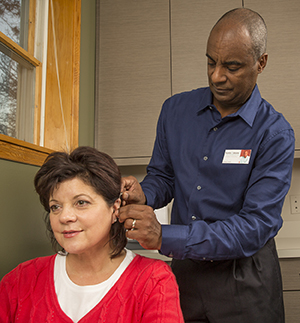Treating Ménière’s Disease: Lifestyle Changes
Certain changes may help you manage Ménière’s disease. They include avoiding certain substances. Special devices may also help make you more comfortable and improve your hearing.
Stay away from certain substances
Certain substances affect how your body regulates fluid and can make Ménière’s disease worse. These include:
-
Caffeine. Caffeine narrows your blood vessels. This reduces blood flow to your inner ear. Stay away from drinks and foods that are high in caffeine, such as coffee, cola, and chocolate.
-
Alcohol. Alcohol can upset your sense of balance. Don't drink alcohol, or limit it to very small amounts.
-
Tobacco smoke. Tobacco smoke narrows your blood vessels, weakens your immune system, and harms your general health. By affecting your circulation, smoking may contribute to Ménière’s symptoms. Quitting smoking is always a good idea.
Maintain a healthy lifestyle
-
Get regular sleep.
-
Eat a nutritious, low-salt diet. Limit the amount of salt (sodium) you eat to between 1,500 mg and 2,000 mg per day, or as advised by your healthcare provider.
-
Get regular exercise, but don't get too tired.
Explore helpful devices
If Ménière’s disease has permanently affected your hearing, a hearing aid may help you hear better. Hearing aids come in many different models. You can find one that's best for your needs and lifestyle. Other devices can help cover up tinnitus. A fan or a radio tuned to music or static, or a white-noise device specifically designed to create background noise may help. A masking device that makes white noise all the time can be worn directly in the ear. Ask your healthcare provider if these devices are right for you.
 |
| Treatment may include maskers and hearing aids. |
Pay attention to your body
People with Ménière’s disease sometimes find that such things as bright lights, loud noises, or very low sounds bring on symptoms or make the symptoms worse. Pay attention to how you feel. If something makes you feel worse, talk with your healthcare provider. Also talk with your healthcare provider if you have any questions.
Online Medical Reviewer:
Ashutosh Kacker MD
Online Medical Reviewer:
Rita Sather RN
Online Medical Reviewer:
Tara Novick BSN MSN
Date Last Reviewed:
4/1/2022
© 2000-2024 The StayWell Company, LLC. All rights reserved. This information is not intended as a substitute for professional medical care. Always follow your healthcare professional's instructions.